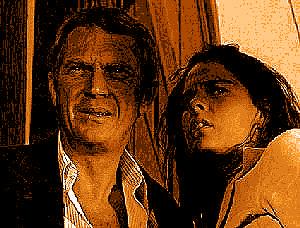Film Review
After their successful collaboration on
Junior Bonner (1972), director Sam Peckinpah
and actor Steve McQueen immediately teamed up again to deliver one of the
grittiest and most atmospheric action-crime movies of the 1970s.
The Getaway was an important
departure for McQueen, allowing him to ditch his familiar nice guy
screen persona that had stuck with him since his debut in
The Blob (1958).
Here he portrays a more complex and ambivalent character, a flawed
anti-hero of dubious morality. Peckinpah is just as inspired by
the film's subject matter and, skilfully avoiding the clichés to which
the heist movie was particularly prone at the time, he crafts a film that
is unremittingly tough and tensely unpredictable.
The Getaway makes few concessions to
the faint-hearted; what it thrusts into our faces is the world of the
hardened criminal as it should be shown, not as glamorous fantasy, but
as something that is cold, ugly and brutal.
McQueen's solid performance (easily one of his best) is complemented by some sterling
contributions from a fine supporting cast - Al Lettieri is particularly
chilling as the main villain of the piece. The one casting let
down is Ali MacGraw who, lacking the rudiments of acting ability,
fails to make her character remotely convincing and just looks like an
unsightly sticking plaster on what might otherwise have been a
faultless production. Whilst the director's stylistic touches
(notably his trademark slow-mo killings and jarring editing) are
sometimes an irritating distraction, Peckinpah is as focussed and
uncompromising as ever, igniting the film with his customary energy and
panache, whilst taunting us with his characteristically cynical
assessment of human nature. However, the main reason to
watch
The Getaway is to
savour McQueen's darkly introspective performance, which is without
doubt one of his finest and most enigmatic.
© James Travers 2011
The above content is owned by frenchfilms.org and must not be copied.
Film Synopsis
Carter McCoy is serving a ten-year stretch in prison. After he is
refused parole, he sends his wife Carol to make a deal with crooked
businessman Jack Benyon. The latter springs McCoy's release on
condition that he takes part in a bank robbery. McCoy agrees to
Benyon's terms and makes meticulous preparations for the hold-up.
Things soon go awry when McCoy's partners in crime - Benyon's hired
thugs - turn treacherous. Benyon repays McCoy by attempting to
seduce his wife. Although McCoy and Carol manage to make a swift
getaway with the loot, their escape is far from certain. Benyon
is a formidable opponent and doesn't give up that
easily...
© James Travers
The above content is owned by frenchfilms.org and must not be copied.


